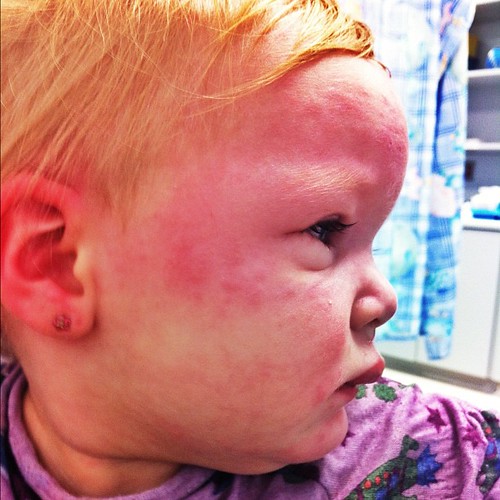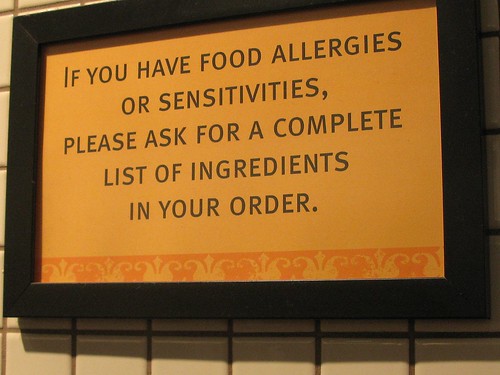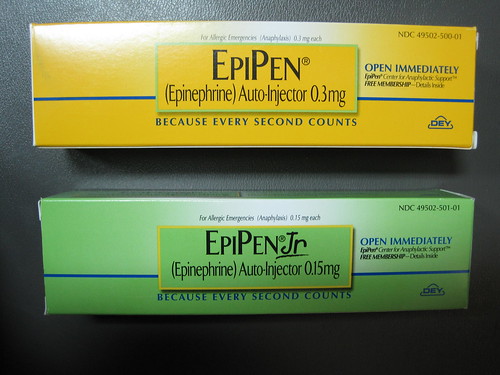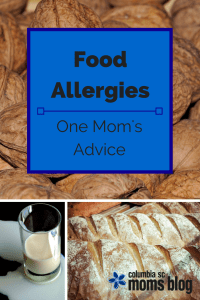Please note, all information below is the advice of one mom based on her experiences with her own children’s food allergies. As always seek the advice of your medical doctor.
May 10-16 is Food Allergy Awareness Week. This week was first created by the Food Allergy & Anaphylaxis Network (now FARE) in 1998. To learn more about food allergies, find resources, and discover ways you can help spread awareness, please visit their site.
Growing up, I lived with seasonal allergies. If it was fall, I suffered. If it was spring, I suffered. If it rained, I suffered. Actually, I still suffer. And so when I made the move into motherhood, I knew there was a pretty good chance I would have children with allergies. Never did I imagine they would also suffer from food allergies.
Here’s what I’ve learned in dealing with my children’s food allergies for the past 8 years. The list below is in no particular order of importance.
Trust your instincts
One of the first things I learned about food allergies: Hives are NOT the only the sign of an allergy. My oldest never experienced hives, but we knew something was wrong. He was diagnosed with eczema, but no matter what we did, things didn’t clear up. We spoke of our concerns with our pediatrician and got her to set us up with an allergist. Only then did we start to get some answers.
There are many symptoms of food allergies, and children may describe their symptoms in ways that may not sound like an allergy problem. Arm yourself with the knowledge of what to look for and listen to. A list of mild and severe symptoms can be found on the FARE site under “Symptoms.” There is also a list of things children may say to describe what they are feeling.
If something doesn’t seem right, it probably isn’t. Trust yourself and ask questions.

Be an advocate
You are your child’s voice, so speak up. This includes speaking up to the doctors when things are going well and when things aren’t quite right. With my son, we finally discovered what he was allergic to and started to see some relief; then suddenly things took a turn for the worse. By keeping track of his medicine regimen, diet, and exposure to various things, we were able to have discussions with his physicians to determine his needs. We found out that my son’s food allergies are constantly changing. One year he can test positive for chicken and all other meats are safe; and then the next year he is allergic to pork and beef, but chicken is safe. Know your child and be their voice.
Also, it is important to be an advocate for your child in academic and social settings. Your child’s safety comes first and I suggest that you be the one to inform those you want to know (which I personally hope would be anyone who works with your child). If your child has a severe allergy, make sure everyone at your child’s daycare, school, sports team, church, etc. know. Don’t just tell the nurse and assume all teachers will be informed and know how to protect your child.
Allergy testing can be HARD
Depending on the doctor, there are a couple of options for allergy testing. Some prefer to start with blood tests; others prefer to primarily use skin testing. There are also options for oral food challenges and trial elimination diets. My kids go through skin testing and once in a while blood tests. One of the hard parts, especially if they take allergy medication for environmental allergies, is taking them off those medicines for the week prior to testing. It’s hard to see your child suffer and not be able to provide them any comfort.
The second hard part is the testing itself. Sometimes my kids can take it like a champ, but other times it is more difficult, especially once the allergy is introduced to the skin and the hive starts to form and the itchy feeling takes over. During the test, you get to try to keep your child as still as possible as well as keep them from scratching. When it is just a dozen or so patches it can be a little easier. When it gets to higher numbers it gets harder (try more than 100 at a time).
I find it helpful to have an extra adult or two with me (I have 2 children who are getting seen by the allergist at the same time and their younger sister with me as well). It is also helpful to have something to help distract them … tablets, smartphone, books, DVD player, etc.

Seek second and even third opinions
I thought things were going great with the first allergist we were seeing. So much so that when my daughter broke out in head to toe hives after a taste of peanut butter before she was 12 months old, I already had her an appointment booked to see my son’s allergist. That was before things stopped being great. This allergist was noticeably getting frustrated that things couldn’t get under control for my son, he was constantly being put on an oral steroid and antibiotics. We were seeing a dermatologist 2 to 3 times a week and the allergist every couple of weeks. The dermatologist finally admitted we should go to MUSC. We took the advice and started seeing a dermatologist and allergist at MUSC.
That was the best move. The allergist there asked many more questions; really took our child’s personal needs into consideration; listed all the foods we said were “staples” for our son; and then actually took the steps to test for foods other than the typical allergenic foods. This is when we learned he was allergic to chicken: not a typical food to be allergic to. When we tried to share the results and new plan with our local allergist, the allergist wanted to hear nothing of it and decided we didn’t need to be a patient there anymore. No problem, we would make the drive to Charleston as often as we needed to, because we walked away after one visit there with more answers than we did after twenty or so visits here.
If you’re not getting results; if your child’s doctor is just guessing at “could it be _____”; if things don’t seem right; or if you feel uncomfortable with anything the doctor is doing, it’s okay to find another doctor and seek another opinion.
Learn to read labels
Once learning what foods to avoid, you need to learn to read labels (and allow for many extra hours at the store). For example with a milk allergy, you need to also look for words such as casein or whey. Corn, on the other hand, has numerous possibilities because many ingredients either are or could be derived from corn. Just a few of the unsuspecting ingredients include: maltodextrin, citric acid, caramel (coloring), xanthan gum. There are many more.
Be careful with wheat. In my experience when my daughter had a wheat allergy, people would say, “Oh well _____ should be safe, it is gluten free.” Wheat and gluten are two different things. Gluten is a specific protein that can be found in wheat, rye, and barley. Wheat has several possibly proteins that may cause the reaction in your child. To be safe, I still read through all the ingredients and don’t just rely on a “gluten free” label.
There are many other ingredients that are similar to those already mentioned. Once you know your child’s specific food allergy, learn all you can about that food, especially other names that may be used for the food.
By the way, it’s also a good idea to let your little one read labels with you. My kids started “reading” the labels long before they could read, and they are now in the habit of making sure something is safe by reading the labels. It’s never to early to teach your child to be their own advocate as well as what to do to keep safe.
This includes going to restaurants. Know what is in the foods you order.

Look at the positive
What do you do when you find out one child is allergic to peanuts, milk, egg, wheat, and yeast? And then find out the other child is allergic to milk, egg, corn, chicken, and banana? What about when your child’s allergies change every six months? Every year?
You allow yourself to cry, yell, whatever you need to do — and then you quickly pull it all together and keep marching on. You learn really quickly what can’t be eaten so you can accurately read those labels, but you also learn quickly that the only way you can keep on moving forward is to focus on the positive. You learn to focus on what your child can have and focus on those items.
There is hope
There is hope because there is chance your child can outgrow a food allergy. Some food allergies are more likely than others to be outgrown, but it is possible. My daughter who was diagnosed with allergies to milk, egg, peanut, wheat, yeast, and corn now happily enjoys pizza, ice cream, sandwiches, tacos, and many more items because she outgrew many of her food allergies. She still has to avoid eggs and nuts, but she outgrew the others.
My son, whose allergies kept changing, was eventually diagnosed with Eosinophilic Esophagitis. He wasn’t lucky enough to outgrow his allergies, because his body decided that almost all foods are worth attacking as if they doesn’t belong. But even for a child like him, there is hope. Thanks to special elemental formulas that are amino acid-based, he gets the nutrition he needs to stay active and healthy. Even though he is on a feeding tube for this, we focus on the positive and are glad we held on to the hope that one day we would find answers so he wouldn’t continue to suffer.
Regardless of your situation, there is hope. You just have to look for it and then hang on to it.
Find a support system
Finding that hope and staying strong and positive is going to require a support system. This support system needs to include people who understand and who will help advocate for your child’s health and safety. If this support cannot be found in your family or friends, then seek out groups of parents who are living with the same issues you are because no matter how strong you may think you are, chances are you will reach a breaking point. If you have a support system in place then there will be help during your entire journey and when you do reach a breaking point, they will be right there for you.
Find a way to deal with all those people
You know the people I’m talking about. The ones who say, “Well, when my kids were picky eaters I just ________.” or “Have you tried ___________?” or “If you let them stay with me for a week, I’ll have them eating in no time.” or “Why should I make my child suffer by not letting them eat a peanut butter sandwich just because your kid can’t handle it?” Yes, those people. Fortunately, I haven’t had many of these experiences, so I don’t have any advice other than be prepared with something to say (or just walk away).
Be creative
The internet will become your friend, especially when it comes to finding substitute ingredients. Then you will just need to play. At first we made cakes with soda instead of eggs, or applesauce instead of eggs, but the consistency doesn’t always work out well to have a cake that doesn’t crumble apart. Now I’ve learned to use flax seed in cakes (as well as baking cakes in a spring pan). Milk gets either soy or rice milk used in its place. You can even make homemade marshmallows …. so much better tasting than those store bought ones. The possibilities are endless; you just need to do some homework and learn what is out there.

As I write, I keep thinking of many more things I could say, but I close with a few brief final pieces of advice:
- Learn your family’s new normal
- Invest in a medical alert bracelet
- Keep those EpiPens (yes, you will get a script for those once diagnosed) handy
- Have an emergency action plan
- And most importantly, keep on living
If your child has food allergies, what lessons have you learned? Share your story in the comments.















